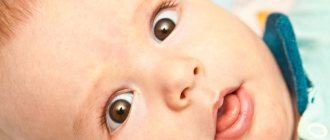Why does a newborn make sounds in his sleep?
During sleep, the newborn breathes irregularly and may make sounds.
And often mothers and fathers notice that the baby’s breathing during sleep is quite irregular, and newborns often make strange sounds, such as sniffling or grunting. In this regard, parents are concerned about questions: what is the baby’s breathing rate that is considered normal and why does he groan, sniffle, and even moan in his sleep?
How does the respiratory system work in babies?
After the birth of a baby, all its organs and systems are only at the stage of full development and it is very important that the baby’s body receives enough oxygen .
Therefore, the infant’s respiratory system is of particular importance, because it provides air flow to all vital systems and organs.
In an infant, the respiratory system does not work the same way as in an adult, since the lower and upper respiratory tracts are still very small and the baby cannot breathe deeply and deeply.
It is for this reason that many parents often observe a frightening picture when a newborn breathes quickly in his sleep, and with the next breath he holds his breath for several seconds . This happens because the baby in the first month of his life does not yet know how to control the respiratory process and for him this pace is the norm.
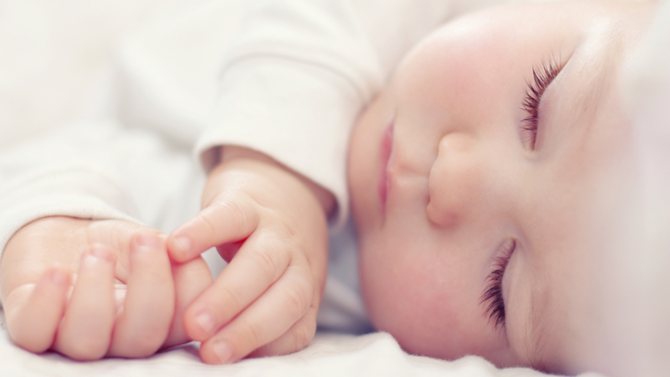
In the first month of life, a baby still does not know how to breathe properly.
Starting from the second month, the baby's breathing becomes more regular and systematic, since his respiratory system is already more adapted to environmental conditions.
Why does a child walk in his sleep: reasons
Sleep is the time when any person (and a child in particular) rests and is in a calm state. However, if we talk about children, there is one significant difference - in their sleep, children grow physically (infant 1, 2, 3, 4 years and older)!
Main reasons:
- The child had a very active day. And such a “restless” dream can be the consequences of a day spent. Perhaps the baby has experienced too many emotional, vivid and intense events that impressed him so much. Thus, such actions in a dream can be a kind of “continuation” in a child at night during sleep. In adults, such manifestations can be encountered much less often only because they have a stronger and already formed nervous system. Pay attention to exactly when the child speaks and what events “met” him on that particular day: did he cry too much, laugh, get nervous, get offended, run around before going to bed. If you experience “sleep activity” after a too “active day,” then you need to reduce your child’s excessive activities before bed: do not scream, do not play sports, do not dance, do not watch cartoons and do not listen to loud music. 1 hour before bedtime, try to relax your baby, calm him down, read him books or sing a lullaby, or give him a massage.
- During this period of life, the baby is actively developing speech skills. His age should be taken into account; speaking skills are formed from approximately 5-6 months to 4-5 years (different for different children, depending on the needs and characteristics of each baby). That is why a child can utter fragments of words or walk in the middle of a restful or restless sleep. Talking in a dream is especially common among children who have reached the age of three (it is at this time that the baby expands his “vocabulary”).
- While speaking, the child experiences a change in sleep phases. We are talking about fast and slow phases, which tend to change for each person. The duration of the phases can be from 1.5 to 6 hours. But, regardless of this, when the “active” phase changes from the “passive” one, “REM sleep” occurs and it is at this moment that children can say something (this sleep is not deep, which means consciousness is working) and walk. Along with conversations, other accompanying phenomena can be observed: movements of the arms and legs, eye movements. This phenomenon should not worry parents, as it is completely normal and due to nature. There is no need to wake up the child; you can just pet him or hug him lightly.
- Problems with the functioning of the nervous system. This is a deviation. It can be determined by paying attention to the presence of other abnormalities: excessive salivation, choking, teeth grinding, loud and restless screams, getting out of bed and walking around the room. If they are present, immediately contact a pediatric neurologist. These may be nightmares in dreams or other central nervous system problems.
IMPORTANT: To know exactly what is happening with your child, you should carefully monitor his behavior and record every deviation.
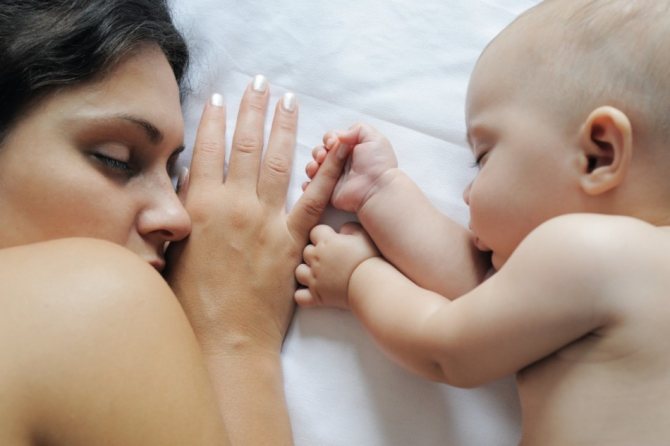
Monitor your baby's sleep patterns at night
How to determine your breathing rate
Determining the rate and frequency of breathing of an infant is one of the primary tasks of new parents.
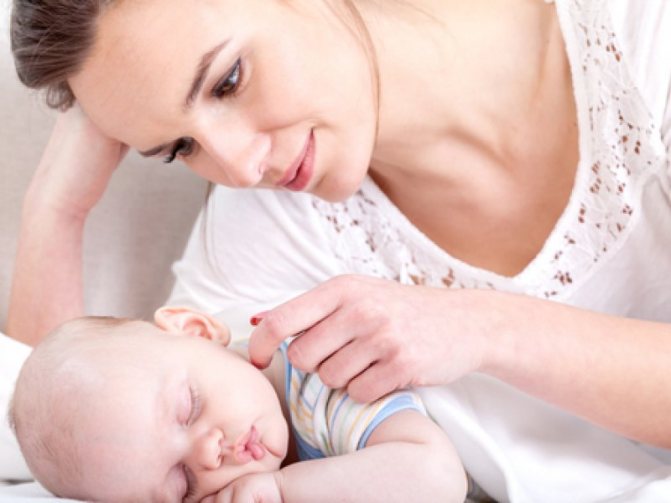
The parents' task is to determine how the baby breathes.
After all, a baby’s breathing is a kind of indicator of the state of his health , and the frequency of inhalations and exhalations can be seen when the baby has problems with this process.
Intermittent rapid breathing in the first month of a newborn's life is normal.
Uneven breathing
Uneven breathing in infants is especially noticeable during sleep . Watching a sleeping baby, inexperienced mothers always think that he does not have enough oxygen or that he begins to choke, as he takes short, frequent breaths.
There is absolutely no reason to panic, because the baby can still breathe exclusively through his nose, and his nasal passages have not yet had time to fully form.
Normal breathing rate
In the first few months of a newborn's life, his breathing rate is fifty to sixty breaths per minute . The following method will help determine whether the baby’s pace is correct: the mother should place her hand on his chest, note the time and count how many inhalations and exhalations her baby made within one minute.
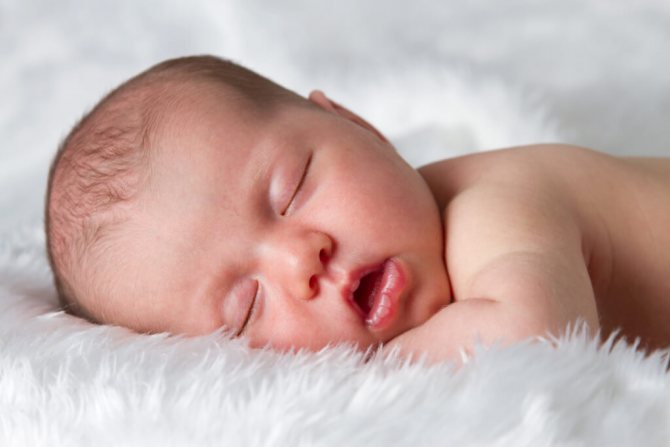
50-60 breaths per minute is the baby's breathing rate in the first months.
If the baby's breathing rate corresponds to the specified norm, then there is no reason for parents to worry. But, if parents notice that his breathing rate is deviated in one direction or another, then it is advisable to consult a pediatrician about this.
A malfunction in a baby’s respiratory system can signal dangerous diseases such as bronchitis or pneumonia, which is why it is so important for parents to control the pace, rhythm and frequency of their breathing, especially during sleep.
Why do babies breathe faster when they sleep?
Newborns' rapid breathing while awake may be caused by intense interest in a brightly colored toy or physical activity, such as gymnastics. Why does a baby often breathe in his sleep, when his body seems to be in a relaxed state?
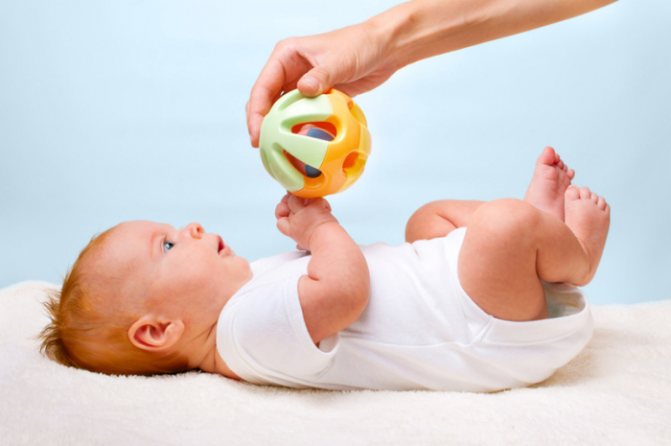
If the baby becomes interested in the toy, his breathing will increase.
Newborn babies cannot breathe fully and deeply, as they have very narrow nasal passages. Therefore, if even microscopic dust particles get into the baby’s nose, then his breathing becomes difficult and rapid.
To prevent mucus and debris from accumulating in your child’s sinuses, you should carefully clean them every day with a cotton swab dipped in baby oil.
Frequent and uneven breathing
If the baby makes wheezing or whistling sounds during rapid breathing, this may be a sign of developing pneumonia or bronchitis .
Parents should also pay attention to the fact that the child can sleep with his mouth open. Sometimes an open mouth during sleep indicates that the baby is hot due to elevated temperature and thus he is trying to restore normal thermoregulation.
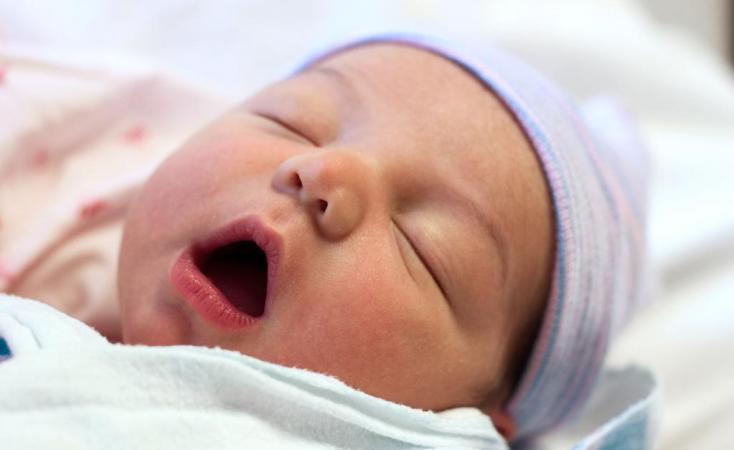
A newborn can sleep with his mouth open.
Frequent and uneven breathing of a newborn baby during sleep may be the first sign of bronchial asthma, therefore, with such symptoms, it is necessary to do a full range of examinations and pass the appropriate tests.
A child smacks his lips: reasons and ways to deal with it
Many young mothers are concerned with the question: “Why does a baby or an older child smack his lips?” What does the child demonstrate with these signals? Is there anything to worry about or is there no reason to worry? Let's look at this in detail.
Why does a baby smack his lips?
Sucking reflex
Smacking can be caused by various reasons. If this is an infant, then this may be due to the so-called “sucking reflex.” The baby has a need to suck. Even when well-fed, the baby smacks his lips. These sucking movements seem to calm and relax him. Busy sucking, the baby quickly falls asleep. Smacking your lips in a dream is not a pathology or any deviation. This is how an overexcited baby relieves stress. A bath with lavender before bed, chamomile infusion and mother's stroking will help the baby feel more comfortable and protected. During the day, a little person usually experiences a ton of emotions and needs to calm down. Smacking your lips in a dream is a manifestation of a kind of self-defense. When he eats, he calms down. So the baby’s body imitates “feeding” in a dream.
Conditioned reflexes in babies from 3 months of age
By the third month of a baby’s life, in addition to the innate reflexes (sucking, swallowing), conditioned ones are added, which appear as a result of the child’s adaptation to the surrounding conditions. So, for example, if you put the baby in the usual feeding position, he may smack his lips.
Everyone also knows that sleep has 2 phases - “fast”, during which we adults dream, and “slow” - sleep without dreams. In infants, the first type of sleep predominates: babies smack their lips, as if they were sucking their mother’s breast in their sleep.
Reasons related to feeding your baby
Many young mothers are concerned about the question: is there enough milk for the baby? In fact, determining this is not so difficult. You just need to follow the signals that the baby himself gives. Early signs that your baby is hungry look like this:
- baby opens and closes mouth
- sticks out tongue;
- smacks lips;
- looking for breasts;
- turning the head.
Why does a baby smack when feeding:
- strong flow of milk;
- incorrect chest grip.
It is necessary to observe the baby and make sure that he is suckling correctly. If there are no problems with this, and the baby grasps the entire nipple and areola, then the cause may be during strong hot flashes, when the baby simply does not have time to suck.
Correct application. To prevent the baby from smacking while sucking, his mouth should be wide open, completely grasping the nipple and approximately 80% of the areola. The lips should be relaxed and slightly turned out, the cheeks should be slightly puffed out, and the rhythm of breast sucking can be seen from them. If you look closely, you will see that the tongue completely encircles the areola at the bottom. In the case when only the edge of the nipple is sucked, you need to remove the breast from him and offer him again. Proper breastfeeding is necessary not only so that the baby stops clicking, but also so that feeding is painless for the mother, and the baby develops a correct bite. Incorrect attachment can cause cracked nipples.
Strong lactation. If a baby smacks his lips while breastfeeding, even if the attachment was correct, this may indicate that he does not have time to swallow milk due to a rapid flow. This happens in the first months after birth, when the lactation process has not yet normalized. To prevent the baby from choking while feeding, the mother needs to express a little milk. Eliminating the cause is as follows: you need to establish the process of breastfeeding the baby and lactation.
Why do older children smack their lips?
If the child is older, this may be due to psychological reasons. The child’s psyche is still fragile and very vulnerable. Various experiences, stressful situations, changes in environment - all this affects the child’s behavior. The baby may kick his legs all night, roll over from side to side, talk in his sleep and smack his lips. It is imperative to observe how the child’s day goes during the day, and whether he is overexcited. This often happens when a child just starts going to kindergarten and adaptation is underway. Even the cancellation of sleep during the day is also a moment for worry.
But there are other reasons why such night sounds can occur. Sometimes the reason lies in the wrong bite. In a child who is sleeping, the muscles are in a relaxed state and the jaw may sink slightly and smacking sounds may be heard. This is not a disease and can be easily eliminated at an early stage.
And another reason may be problems with the gastrointestinal tract, when when bile is thrown into the esophagus, there may be a reflex swallowing, while the child smacks his lips. In this case, you need to contact medical specialists. The most correct thing in this situation is a comprehensive examination of the baby by a psychologist or gastroenterologist.
tvoyzubnoy.ru
Reasons why a baby makes various sounds during sleep
Often, parents, standing by the crib of a fallen baby, notice that his calm, serene sleep is interrupted by strange sounds, such as snorting, snoring, grunting and even grunting . Why does a baby make different sounds in his sleep and is this phenomenon considered normal?
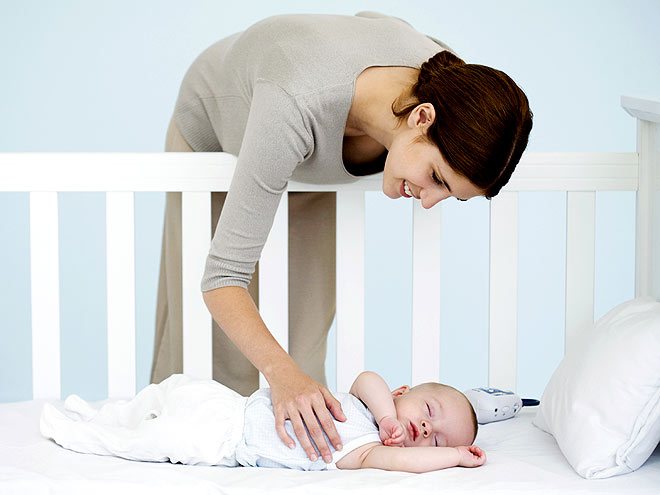
A newborn's sleep may be accompanied by snoring or grunting.
If a child moans or cries in his sleep , then perhaps he is trying to throw out the negative emotions that he experienced during the day. But it is also likely that the baby had an unpleasant dream, because it has long been proven that newborns are capable of seeing vivid and realistic dreams.
Snore
Sometimes a newborn makes characteristic sounds in his sleep, reminiscent of snoring or the snorting of an angry hedgehog . This is very worrying and frightening for young parents, but there is no need to worry . Such sounds are caused by vibration of the larynx, which is very soft in infants and can sink into the throat when inhaling.
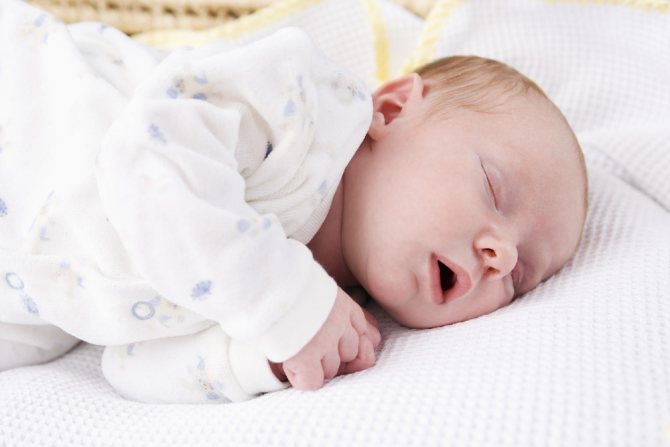
There is no need to worry about your baby's snoring.
You can stop snoring by gently turning your baby onto his tummy.
Purr
Sounds made by a baby during sleep that resemble the purring or trill of a songbird . A newborn may also smack his lips while sleeping, while smiling and twitching his arms and legs.
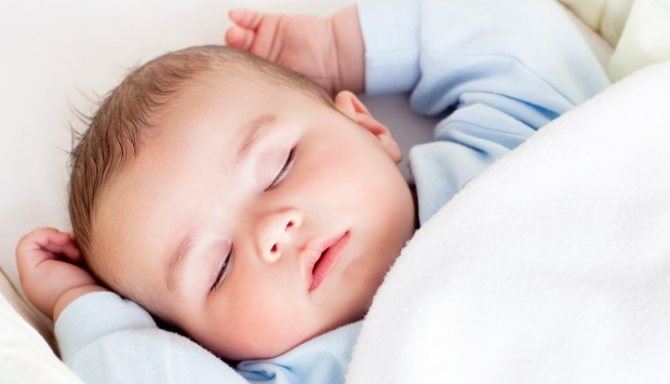
The baby may make purring sounds in his sleep and twitch his arms.
This is due to the fact that babies often experience in their sleep exactly the emotions that filled the past day. They see in their dreams how their mother fed them, how she smiled and hummed a lullaby.
Newborn groans
But when a newborn grunts in his sleep , while tucking his legs to his tummy, this may be a signal that the baby is suffering from colic and abdominal cramps. To alleviate these symptoms, you should give your baby special medications that help reduce bloating and reduce pain.
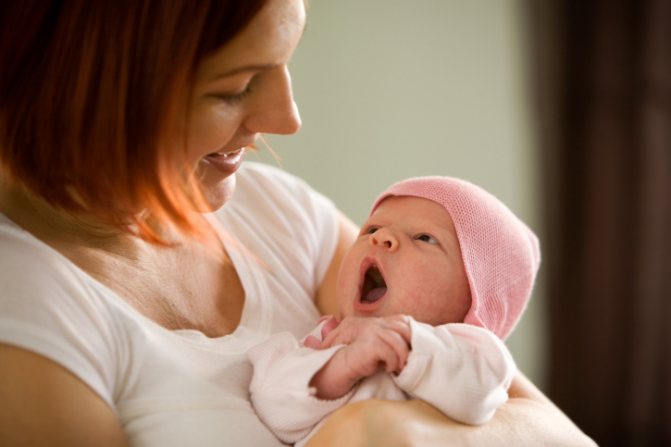
As the child develops, his respiratory system will develop.
The different sounds a baby makes are most often not a cause for concern, so parents should not look for non-existent medications to treat snoring or snorting. When the baby grows up and his respiratory system is fully formed, everything will return to normal.
Assumption one
Such activity during sleep is the result of stress experienced the day before, and not necessarily negative. For example, a child had too many vivid impressions, strong emotions... If this reason can actually cause sleep-speaking, then it becomes clear why children talk in their sleep more often than adults. After all, young children perceive the real events of the day more acutely, and their nervous system is less stable and less mature than that of adults.
Advice to parents: do not reach for sedative herbs and potions if you associate your child’s restless nights with his hectic waking life. Sedatives are not taken once, but in courses and only under the supervision of a doctor. If the baby just talks in his sleep and you don’t notice any other neurotic reactions in him, he doesn’t need treatment. You can make sure that there is a calm atmosphere at home in the evening, that the TV is not on until late, that the nursery is cool at night, that the child takes walks every day - these recommendations will benefit anyone.
But if even during the day your child is overly emotional and reacts to everything with bursts of screaming and crying, perhaps you should show him to the doctor. A neurologist can prescribe nootropic or metabolic drugs that will improve blood circulation in the brain, help the brain mature faster, and then the child’s behavior and sleep will become calmer.
A few rules for a peaceful baby's sleep
In order for a newborn baby to sleep peacefully and have only pleasant, vivid dreams, it is advisable for parents to create the most comfortable conditions for him.
- Baby pajamas should be made of natural material and be loose-fitting so as not to hinder the baby’s movements.
- The room in which a newborn sleeps must be regularly ventilated and ensure optimal air humidification .
- The baby's first mattress should be hard and not soft, like a feather bed. In addition, pillows should not be placed in the crib.
- While the baby is sleeping, parents should constantly visit him to check whether the baby has thrown a blanket over his head and whether he is sleeping face down.
- In the first months of life, infants should sleep on their side or back , and not on their tummy. When a baby sleeps on his stomach, his breathing quickens and then the parents think that he begins to suffocate.

The material of pajamas should have a natural composition and not restrict movement.

